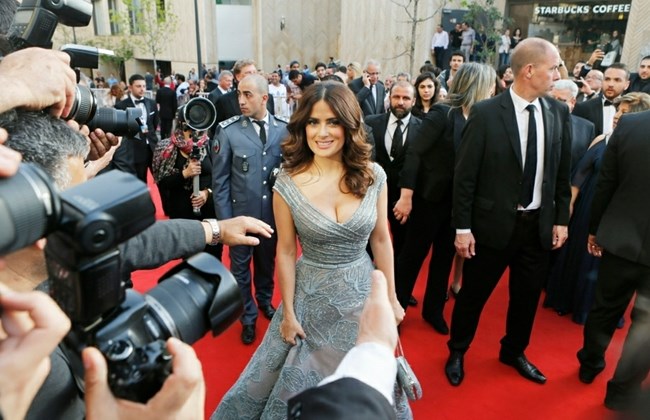Salma Hayek and Angelina Jolie’s “CHR”
Hiba Huneini| The Daily Star/Apr. 30, 2015
The first visit of Salma Hayek to her ancestral homeland, Lebanon, aimed to launch the animated feature film “The Prophet” attracted all the national and international media. Promoting the artwork of one of the most prominent Lebanese-American poets in history, Gibran Khalil Gibran, puts Lebanon under the spotlight again to highlight its cultural assets.
This stresses the importance of culture as the driving factor for achieving sustainable development. With culture, we can reinforce our identity and fill people with hope to re-build the bridge of trust among them that has been cracked or destroyed in many societies.
Besides Salma Hayek’s cultural mission, she has played a humanitarian role by visiting a Syrian refugee camp in Lebanon to raise awareness on the urgent humanitarian needs of children and families affected by the Syrian crisis. Hayek also launched the “CHIME for the Children of Syria” campaign to support UNICEF’s efforts to ensure access of education and services to heal the psychosocial impact of the brutal violence they experienced. “CHIME for the Children of Syria” is part of the global campaign “CHIME for Change” founded by Gucci to use innovative approaches and tools for raising funds and awareness on issues related to education, health and justice.
Salma Hayek’s humanitarian visit and support to Syrian refugees was preceded few days ago by the speech of Angelina Jolie Pitt, special envoy for Refugee Issues of UNHCR, in the Security Council meeting held on April 24, 2015. As the crisis in Syria enters its fifth year, with more than 220,000 killed, 7.6 million displaced and nearly 4 million people seeking refuge in neighboring countries, the meeting called for coordinated international support to hinder the Syrian crisis that has become the largest humanitarian emergency in the world.
“I am here for them because this is their United Nations,” is what Angelina declared in her speech in the name of Syrians’ pain, anger and misery. Such a famous actor was not using the stage but an international political platform to speak out loud and question the Security Council’s credibility and its ability to stem conflicts. Her messages have been followed all over the globe to reach equally concerned and unconcerned people about the Syrian crisis.
This meeting has been considered an essential turning point in the Syrian crisis at the level of criticizing the international response that had so far fallen short of meeting the needs and expectations. However, following the media coverage of the Security Council meeting was a learning process on the effective humanitarian and social work a celebrity can play in mobilizing people and affecting decision-makers.
Angelina Jolie has been part of the United Nations system for 13 years, working in humanitarian aid in silence with no tokenism, propaganda or fashion designers. This proves the power of investing one’s fame and success in being a change-maker that can raise awareness and advocate through reaching all social classes and targets.
Other examples of celebrities using their voices for various causes have been recorded all over the world. For instance, Leonardo DiCaprio didn’t stand as an actor but as a concerned citizen at the U.N. Climate Summit in 2014. He addressed the climate crisis as the greatest challenge that we should all face with courage. In recognition of his environmental commitment, United Nations Secretary-General Ban Ki-moon designated DiCaprio as the U.N. Messenger of Peace on Climate Change due to his credibility in working on the climate change cause.
The deteriorating situation in the region urgently requires massive work and innovative tools in responding to our crisis and emerging needs. The humanitarian missions and leading roles of such actors and celebrities the increased need for developing and promoting the Celebrity’s Humanitarian Responsibility “CHR” concept. As Corporate Social Responsibility “CSR” is being promoted and elaborated, “CHR” should be documented and studied scientifically as an essential tool in humanitarian aid and sustainable development work. This is due to celebrites’ power of rapidly affecting the public opinion, as well as ensuring the community participation and engagement in any cause or intervention.
Our question should be put to our national and regional celebrities in the Arab world:
When will the true concept of “Celebrity’s Humanitarian Responsibility” be adopted and integrated as part of your work for the sake of the millions that are dying and suffering in our eroding societies?
**Hiba Huneini is acting manager of Youth & Civic Engagement Program at the Hariri Foundation for Sustainable Human Development.























